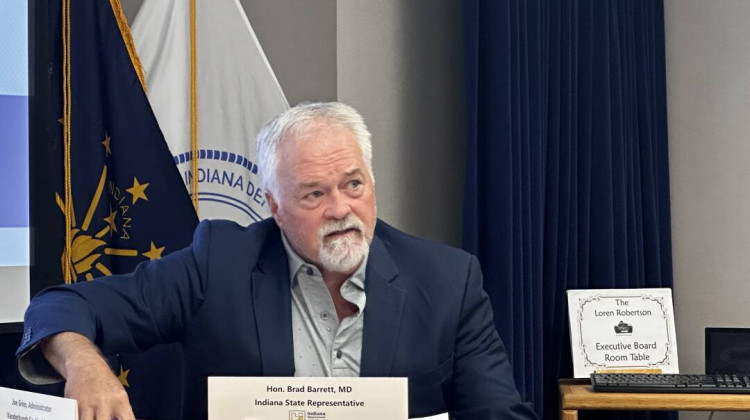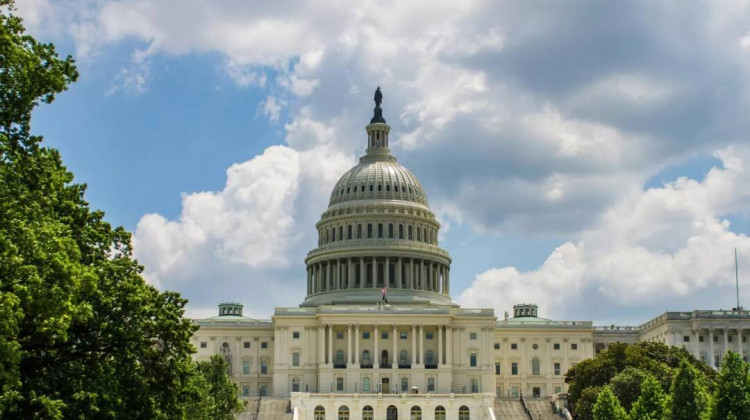
Marsha Day's only son, Ryan, struggled with depression and died by suicide at 25. She founded Ryan’s Hope Ministries, raising money and awareness for suicide prevention.
Carter Barrett/Side Effects Public MediaOn this sweltering summer day, only a few people walk by Mousie’s restaurant. The building’s blue facade stands out next to its neutral surroundings. In one of its circular windows, there’s a neon "open" sign that’s turned off.
It's just one example of the economic decline in Connersville, Indiana, once known as "Little Detroit."
After 65 years in business, Mousie’s closed late last year. Marsha Day, who used to be a waitress here, says the restaurant was a popular spot for the factory employees up the street.
“We got a lot of the shop business and a lot of union meetings taking place down there,” Day says, adding that their prime rib was the best.

Mousie's closed in December 2018 after 65 years in business. (Carter Barrett/Side Effects Public Media)
Day grew up in Fayette County, near the Ohio border. The county seat, Connersville, once was bustling with factories that served the auto industry. Workers turned out air conditioning systems, fuel injectors and other products.
Now, it has a grim distinction: the highest suicide and overdose death rates in the state.
“I mean, it used to be booming. We had shoe stores, dress shops, department stores downtown," Day says. "Now we don't have any of those."
As factories closed and downtown declined, some statistics rose: unemployment, drug use and suicides. And Day’s only son, Ryan, who struggled with depression, died by suicide at 25 amid a breakup with his girlfriend.
“When you have a child, you don't think that you're going to bury them first,” Day says. “They're supposed to bury you.”
The county’s rapid spike in overdose deaths has outpaced state and national trends, according to data from NORC at the University of Chicago, a non-partisan research center. In fact, the county’s drug overdose rate is five times higher than the national average.
Micheal Meit is co-director of the NORC Walsh Center for Rural Health Analysis. He says Fayette County mirrors parts of Appalachia, where mining continues to disappear.
“As job opportunity is lost within a community, it really creates an environment that is ripe for things like drug addiction and overdose,” he says.
Meit says so-called "deaths of despair"— overdose, suicide, and alcohol-related liver disease — are likely intertwined.
Don Kelso, director of the Indiana Rural Health Association, has seen people struggle in rural communities as opportunity declines.
“They just don't see any hope they don't see any way out,” he says. “I hear some of the same stories that I did when I was just a kid growing up in the ‘60s from some of the inner city things just how do you get out of this cycle? I’m seeing that now in some of the rural communities, the very same.”

Many of the storefronts in downtown Connersville are empty. (Side Effects Public Media)
“People are sometimes reluctant to go to a mental health provider because somebody will see your car there, ‘Oh, look, Don must be having mental problems,’” Kelso says.
One group trying to combat this is End Stigma. Their billboards dot the highway on the way into Connersville.
The group received state funding to address the stigma of substance abuse, but organizer and County Councilor Holly Dunn says mental health is part of the same fight.
“The correlation is huge,” Dunn says. “If you have a mental illness, you are at a greater risk, to also develop a substance use disorder.”
End Stigma tries to reach people through block parties, back to school events and social media. Despite the troubling statistics, the Connersville-transplant Dunn says it’s a great town.
“I choose personally to live here because I know that there are a lot of well-intending people that want to make a difference,” Dunn says.
Day also is working to address stigma.
“Mental health and suicide are taboo,” she says. “They see it as, as in the movie One Flew Over the Cuckoo's Nest, Clockwork Orange ...”
Day raises money and awareness for suicide prevention. She founded Ryan’s Hope Ministries several years after her son’s death.
“I try not to do the if-only's and the shoulda, woulda, coulda,” Day says. “You can’t.”

Ryan Day leans against his teal blue Mustang. His mom, Marsha, says he loved his guitars, Mustangs and Pizza King. (Photo courtesy of Marsha Day)
In the kitchen of her church, Day looks down at a photo of Ryan. Arms crossed, he leans against his teal blue Mustang.
She remembers sitting him down as a young boy and listening to a song she hoped he would carry with him: Lynyrd Skynard’s "Simple Man."
Oh take your time, don't live too fast
Troubles will come and they will pass.
She says, “The great part of that song is reminding them that God is there, no matter what.”
This story was produced by Side Effects Public Media, a news collaborative covering public health.
People in need can call a suicide hotline number at the National Suicide Prevention Lifeline at 1-800-273-TALK (1-800-273-8255) to reach a trained counselor. The national crisis text line can be accessed by texting CONNECT to 741741. An online chat option is available by going to suicidepreventionlifeline.org/chat/ and entering your zip code.
 DONATE
DONATE










 Support WFYI. We can't do it without you.
Support WFYI. We can't do it without you.